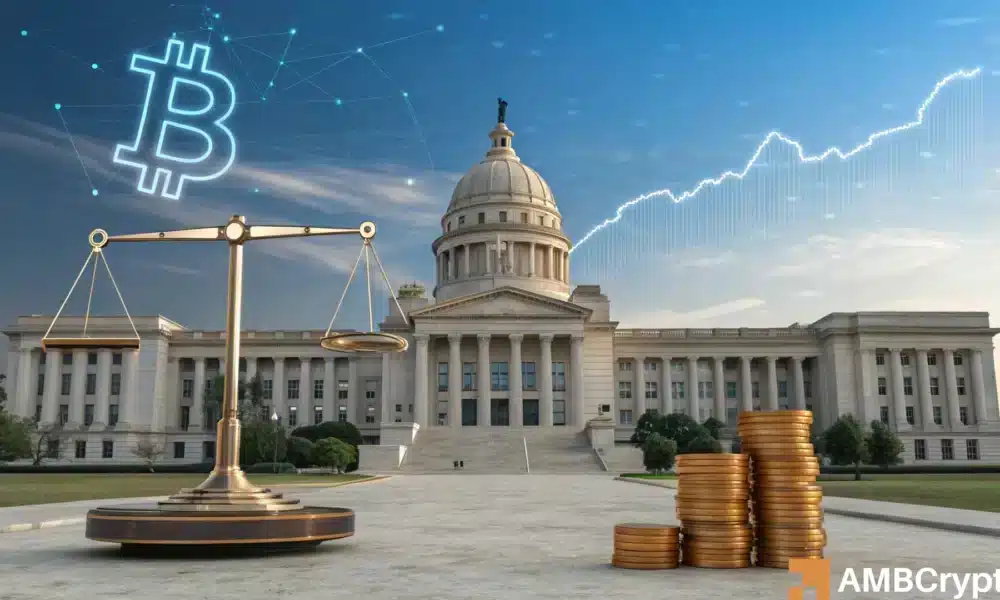- Oklahoma’s HB 1203 could allow 10% of public funds into Bitcoin.
- Nic Carter warns large-scale government buying could shake markets and dollar stability.
Oklahoma is moving closer to becoming the first U.S. state to integrate Bitcoin [BTC] into its public financial reserves.
The Strategic Bitcoin Reserve Act (HB 1203) has passed a key House committee with a 12-2 vote, sending it to the House floor for a final decision.
If enacted, the bill would allow Oklahoma to invest up to 10% of its public funds in Bitcoin and other large-cap digital assets exceeding a $500 billion market cap.
“This bill is about protecting the hard-earned money of Oklahoma’s citizens”
The proposal targets funds from the State General Fund, Revenue Stabilization Fund, and Constitutional Reserve Fund.
It outlines custody requirements that allow digital assets to be held directly, through a qualified custodian, or via exchange-traded products.
Under the current language, this framework would take effect on the 1st of November, if the bill clears the House floor vote and any subsequent approvals.
The bill’s sponsor, Representative Cody Maynard, framed the legislation as a defense against monetary devaluation.
Maynard said,
“This bill is about protecting the hard-earned money of Oklahoma’s citizens. By diversifying our state’s savings and pension funds into digital assets, we are not only securing a stronger financial future for our state but also demonstrating Oklahoma’s leadership in adopting innovative fiscal policies.”
A reserve strategy or a risk to dollar stability?
Supporters see the measure as a safeguard against rising prices. Maynard calls Bitcoin “the ultimate store of value,” contending that its finite supply prevents governments from “printing away purchasing power.”
Dennis Porter, CEO of the Satoshi Act Fund, called the committee vote a “big breaking” development,

Source: X
Maynard’s stance mirrors the national conversation sparked by President Donald Trump. Trump suggested that embracing Bitcoin could help pay off the U.S. national debt,
“Maybe we’ll pay off our $35 trillion debt.”
Maynard’s camp argues that Bitcoin’s decentralized nature insulates it from political or bureaucratic manipulation,
“As a decentralized form of money, Bitcoin cannot be manipulated or created by government entities. It is the ultimate store of value for those who believe in financial freedom and sound money principles.”
Yet the notion of a strategic Bitcoin reserve has drawn skepticism from leading industry figures. Nic Carter, co-founder and partner at Castle Island Ventures, supports the government holding Bitcoin already in its possession but opposes large-scale buying.
Referring to similar legislation proposed in the U.S. he explained,
“If the likelihood of the Lummis SBR proposal approaches certainty, financial markets would collapse. In my view, if the Lummis SBR proposal approaches reality, markets will go haywire, forcing Trump to withdraw the policy.”
A nationwide trend toward state-level Bitcoin reserves
Oklahoma is not alone in considering Bitcoin as part of its financial future.
Several U.S. states, including Pennsylvania, Texas, New Hampshire, and North Dakota, Ohio have introduced similar proposals to establish Bitcoin reserves.
In fact, U.S. state-led Bitcoin Reserve bills could generate over $23 billion in BTC demand, potentially triggering a supply shock as states like Texas remove purchase limits.


Source: 2025 Cryptocurrency Adoption and Consumer Sentiment Report
These legislative efforts coincide with increasing cryptocurrency adoption nationwide.
According to the 2025 Cryptocurrency Adoption and Consumer Sentiment Report, 28% of American adults now own digital assets, nearly doubling since 2021.
Interest in Bitcoin remains strong, with 74% of crypto holders owning BTC and 69% of investors reporting net gains in their portfolios.
What comes next?
The outcome of Oklahoma’s vote could set the stage for a broader shift in how states manage public funds, potentially marking a new era of government-backed Bitcoin adoption.
If successful, this legislation could encourage other states to reevaluate their financial strategies in favor of digital asset diversification.
For now, all eyes are on Oklahoma’s lawmakers as they decide whether Bitcoin will become an official part of the state’s financial future.

